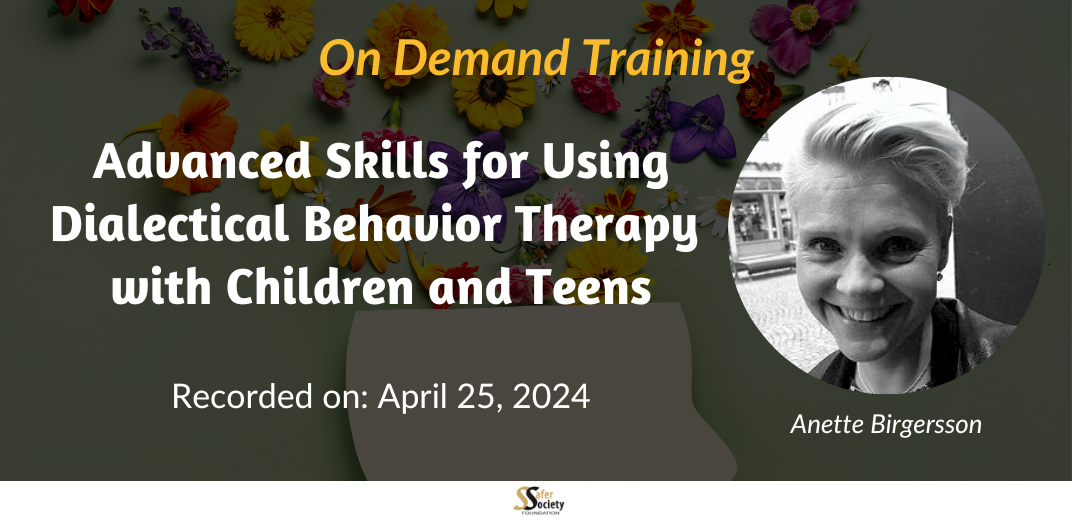
Advanced Skills for Using Dialectical Behavior Therapy with Children and Teens
Already purchased an On Demand training?
Click here to access your Safer Society On-Demand Training Center account.

Dialectical behavior therapy (DBT) is a structured approach to helping clients learn to manage intense emotions and negotiate relationships. For these reasons, it is a natural fit for counseling children and teens in school and mental health settings. It can be used in individual and group settings, and there are many helpful resources available for its administration.
This training closely examines DBT skills and offers ideas for immediate practical application with children and teens. It builds on and extends the introductory training also available on-demand. Although this training assumes that attendees have some familiarity with this method of treatment, attending the earlier training is not a prerequisite. Whereas the introductory training provides an overview of DBT skills and concepts, this advanced training examines more intensively how to use these same skills in practice.
Key topics include:
-
- Effectively addressing problematic behaviors with DBT
- Applying DBT skills in school counseling and other mental health settings
- Getting recalcitrant young clients engaged in treatment and ready to work on their skills
- Developing a deeper understanding of the key concepts of DBT
-
- Strengthening existing DBT skills:
- Mindfulness skills
- Distress tolerance skills
- Emotional regulation skills
- Relationship skills
- Strengthening existing DBT skills:
During the training, the following questions will be addressed:
-
- How can professionals use DBT more effectively in considering problematic behaviors from a needs and vulnerability perspective?
- How can we better use validation as a superpower in counseling?
- How is the idea of “wise mind” different from “emotional mind” and “reasonable mind”?
1) Apply key concepts of DBT skills.
2) Create treatment plans for managing intense emotions and negotiating relationships.
3) Create interventions for distress tolerance.
4) Use validation with teens who present with challenging behaviors.
5) Explain methods for overcoming barriers to effective treatment engagement.
Audience
This training is for professionals working with people who have experienced complex trauma as well as people who have perpetrated abuse. Professionals who will benefit from this training include social workers, psychologists, clinical counselors, and interested paraprofessionals.
Content Level
Who's Presenting

Anette Birgersson
Anette Birgersson, is a licensed psychotherapist with over 20 years of experience working with children and adolescents with trauma, neuropsychiatric diagnoses, and harmful sexual behaviors. Anette is trained in Cognitive Behavioral Therapy, Dialectical Behavior Therapy, Trauma-Focused Cognitive Behavioral Therapy (TF-CBT), Prolonged Exposure, Eye Movement Desensitization and Reprocessing, and Emotional Regulation Group Therapy. She is also a certified TF-CBT trainer. Anette is well-known in her home country of Sweden for developing culturally appropriate programming for treating youth who have sexually abused and young children. After almost two decades of work in this area, Anette opened her own company, Skills Clinic, which has led to her conducting training and supervision all over Europe, Scandinavia, Australia, and the United States. Anette is a NAPN Advisory Board member and sits on several committees for the Association for the Treatment of Sexual Abusers (ATSA: USA).
